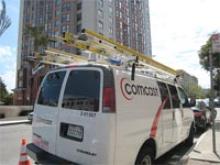Lafayette Dealing with Expected Headaches
No matter how much community broadband advocates prepare the community and elected officials for the expected difficulty of building a successful local project, in the midst of the deployment, times are tough.
A local paper in Lafayette claims "LUS Fiber [is] at a crossroads" but starts with an admission that these problems were forecast and expected:
Competitors will pay less for programming than you do, and in turn play hard ball by lowering rates for customers. Good luck keeping up with technological advances, expansion needs and growth costs; it's a risky proposition for a public entity used to maintaining rather than adapting. Your opportunities will be limited because you can't provide services outside the city limits. You'll be criticized for offering programming such as adult movies, and you'll be told you really should be focusing on your core business: running power, water and wastewater plants.Terry Huval delivered that message in 2000, long before Lafayette committed to building their community fiber network -- a network that delivers some of the fastest speeds in the nation at the lowest rates and has already delivered hundreds of jobs. Nonetheless, LUS Fiber is behind the take rate goals they had set in the business plan. The expenses are higher than forecast because Lafayette was unfairly denied entry to a coop that secures lowers rates for television contracts for members. The only discernible reason for rejecting Lafayette is that Cox joined the coop after Lafayette committed to building its network. There is little doubt that Cox was influential in denying Lafayette's application, likely increasing LUS Fiber expenses for offering cable channels by more than 20%. This is just one of the many ways that the telecommunications market is rigged to benefit incumbents at the expense of all of us -- residents and small businesses alike. We will not have real choices in competition until government policy treats telecom like the essential infrastructure it is. Mike Stagg, a long time supporter of the network is quoted in the article, challenging LUS Fiber to improve its marketing:
Can they do better? Probably so. Part of it is the fact that, just from a mindset standpoint, LUS is a utility and utilities generally do not compete," Stagg said.




